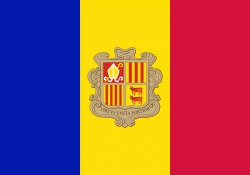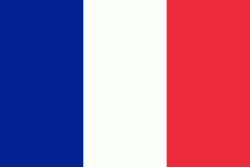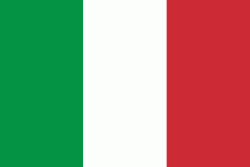Catalan language
Catalan (autonym: català, ), known in the Valencian Community and Carche as Valencian (autonym: valencià), is a Western Romance language. It is the official language of Andorra, and an official language of three autonomous communities in eastern Spain: Catalonia, the Valencian Community, and the Balearic Islands. It also has semi-official status in the Italian comune of Alghero. It is also spoken in the Pyrénées-Orientales department of France and in two further areas in eastern Spain: the eastern strip of Aragon and the Carche area in the Region of Murcia. The Catalan-speaking territories are often called the Països Catalans or "Catalan Countries".
The language evolved from Vulgar Latin in the Middle Ages around the eastern Pyrenees. Nineteenth-century Spain saw a Catalan literary revival, culminating in the early 1900s.
The word Catalan is derived from the territorial name of Catalonia, itself of disputed etymology. The main theory suggests that Catalunya (Latin Gathia Launia) derives from the name Gothia or Gauthia ("Land of the Goths"), since the origins of the Catalan counts, lords and people were found in the March of Gothia, whence Gothland > Gothlandia > Gothalania > Catalonia theoretically derived.
In English, the term referring to a person first appears in the mid 14th century as Catelaner, followed in the 15th century as Catellain (from French). It is attested a language name since at least 1652. The word Catalan can be pronounced in English as, or.
The endonym is pronounced in the Eastern Catalan dialects, and in the Western dialects. In the Valencian Community and Carche, the term valencià is frequently used instead. Thus, the name "Valencian", although often employed for referring to the varieties specific to the Valencian Community and Carche, is also used by Valencians as a name for the language as a whole, synonymous with "Catalan". Both uses of the term have their respective entries in the dictionaries by the Acadèmia Valenciana de la Llengua and the Institut d'Estudis Catalans. See also status of Valencian below.
The language evolved from Vulgar Latin in the Middle Ages around the eastern Pyrenees. Nineteenth-century Spain saw a Catalan literary revival, culminating in the early 1900s.
The word Catalan is derived from the territorial name of Catalonia, itself of disputed etymology. The main theory suggests that Catalunya (Latin Gathia Launia) derives from the name Gothia or Gauthia ("Land of the Goths"), since the origins of the Catalan counts, lords and people were found in the March of Gothia, whence Gothland > Gothlandia > Gothalania > Catalonia theoretically derived.
In English, the term referring to a person first appears in the mid 14th century as Catelaner, followed in the 15th century as Catellain (from French). It is attested a language name since at least 1652. The word Catalan can be pronounced in English as, or.
The endonym is pronounced in the Eastern Catalan dialects, and in the Western dialects. In the Valencian Community and Carche, the term valencià is frequently used instead. Thus, the name "Valencian", although often employed for referring to the varieties specific to the Valencian Community and Carche, is also used by Valencians as a name for the language as a whole, synonymous with "Catalan". Both uses of the term have their respective entries in the dictionaries by the Acadèmia Valenciana de la Llengua and the Institut d'Estudis Catalans. See also status of Valencian below.
Country
-
Andorra
Andorra, officially the Principality of Andorra, is a sovereign landlocked microstate on the Iberian Peninsula, in the eastern Pyrenees, bordered by France to the north and Spain to the south. Believed to have been created by Charlemagne, Andorra was ruled by the count of Urgell until 988, when it was transferred to the Roman Catholic Diocese of Urgell. The present principality was formed by a charter in 1278. It is currently headed by two co-princes: the bishop of Urgell in Catalonia, Spain and the president of France. Its capital and largest city is Andorra la Vella.
Andorra is the sixth-smallest state in Europe, with an area of 468 km2 and a population of approximately. The Andorran people are a Romance ethnic group of originally Catalonian descent. Andorra is the world's 16th-smallest country by land and 11th-smallest by population. Its capital, Andorra la Vella, is the highest capital city in Europe, at an elevation of 1023 m above sea level. The official language is Catalan, but Spanish, Portuguese, and French are also commonly spoken. -
France
France, officially the French Republic (République française ), is a country primarily located in Western Europe. It also includes overseas regions and territories in the Americas and the Atlantic, Pacific and Indian Oceans. Its metropolitan area extends from the Rhine to the Atlantic Ocean and from the Mediterranean Sea to the English Channel and the North Sea; overseas territories include French Guiana in South America, Saint Pierre and Miquelon in the North Atlantic, the French West Indies, and many islands in Oceania and the Indian Ocean. Due to its several coastal territories, France has the largest exclusive economic zone in the world. France borders Belgium, Luxembourg, Germany, Switzerland, Monaco, Italy, Andorra, and Spain in continental Europe, as well as the Netherlands, Suriname, and Brazil in the Americas via its overseas territories in French Guiana and Saint Martin. Its eighteen integral regions (five of which are overseas) span a combined area of 643801 km2 and contain close to 68 million people. France is a unitary semi-presidential republic with its capital in Paris, the country's largest city and main cultural and commercial centre; other major urban areas include Marseille, Lyon, Toulouse, Lille, Bordeaux, and Nice.
Inhabited since the Palaeolithic era, the territory of Metropolitan France was settled by Celtic tribes known as Gauls during the Iron Age. Rome annexed the area in 51 BC, leading to a distinct Gallo-Roman culture that laid the foundation of the French language. The Germanic Franks formed the Kingdom of Francia, which became the heartland of the Carolingian Empire. The Treaty of Verdun of 843 partitioned the empire, with West Francia becoming the Kingdom of France in 987. In the High Middle Ages, France was a powerful but highly decentralised feudal kingdom. Philip II successfully strengthened royal power and defeated his rivals to double the size of the crown lands; by the end of his reign, France had emerged as the most powerful state in Europe. From the mid-14th to the mid-15th century, France was plunged into a series of dynastic conflicts involving England, collectively known as the Hundred Years' War, and a distinct French identity emerged as a result. The French Renaissance saw art and culture flourish, conflict with the House of Habsburg, and the establishment of a global colonial empire, which by the 20th century would become the second-largest in the world. The second half of the 16th century was dominated by religious civil wars between Catholics and Huguenots that severely weakened the country. France again emerged as Europe's dominant power in the 17th century under Louis XIV following the Thirty Years' War. Inadequate economic policies, inequitable taxes and frequent wars (notably a defeat in the Seven Years' War and costly involvement in the American War of Independence) left the kingdom in a precarious economic situation by the end of the 18th century. This precipitated the French Revolution of 1789, which overthrew the Ancien Régime and produced the Declaration of the Rights of Man, which expresses the nation's ideals to this day. -
Italy
Italy (Italia ), officially the Italian Republic, or the Republic of Italy, is a country in Southern and Western Europe. Located in the middle of the Mediterranean Sea, it consists of a peninsula delimited by the Alps and surrounded by several islands; its territory largely coincides with the homonymous geographical region. Italy shares land borders with France, Switzerland, Austria, Slovenia and the enclaved microstates of Vatican City and San Marino. It has a territorial exclave in Switzerland, Campione. Italy covers an area of 301230 km2, with a population of about 60 million. It is the third-most populous member state of the European Union, the sixth-most populous country in Europe, and the tenth-largest country in the continent by land area. Italy's capital and largest city is Rome.
Italy was the native place of many civilizations such as the Italic peoples and the Etruscans, while due to its central geographic location in Southern Europe and the Mediterranean, the country has also historically been home to myriad peoples and cultures, who immigrated to the peninsula throughout history. The Latins, native of central Italy, formed the Roman Kingdom in the 8th century BC, which eventually became a republic with a government of the Senate and the People. The Roman Republic initially conquered and assimilated its neighbours on the Italian peninsula, eventually expanding and conquering a large part of Europe, North Africa and Western Asia. By the first century BC, the Roman Empire emerged as the dominant power in the Mediterranean Basin and became a leading cultural, political and religious centre, inaugurating the Pax Romana, a period of more than 200 years during which Italy's law, technology, economy, art, and literature developed. -
Spain
Spain (España, ), or the Kingdom of Spain (Reino de España), is a country primarily located in southwestern Europe with parts of territory in the Atlantic Ocean and across the Mediterranean Sea. The largest part of Spain is situated on the Iberian Peninsula; its territory also includes the Canary Islands in the Atlantic Ocean, the Balearic Islands in the Mediterranean Sea, and the autonomous cities of Ceuta and Melilla in Africa. The country's mainland is bordered to the south by Gibraltar; to the south and east by the Mediterranean Sea; to the north by France, Andorra and the Bay of Biscay; and to the west by Portugal and the Atlantic Ocean. With an area of 505990 km2, Spain is the second-largest country in the European Union (EU) and, with a population exceeding 47.4 million, the fourth-most populous EU member state. Spain's capital and largest city is Madrid; other major urban areas include Barcelona, Valencia, Seville, Zaragoza, Málaga, Murcia, Palma de Mallorca, Las Palmas de Gran Canaria and Bilbao.
Anatomically modern humans first arrived in the Iberian Peninsula around 42,000 years ago. The ancient Iberian and Celtic tribes, along with other pre-Roman peoples, dwelled the territory maintaining contacts with foreign Mediterranean cultures. The Roman conquest and colonization of the peninsula (Hispania) ensued, bringing the Romanization of the population. Receding of Western Roman imperial authority ushered in the migration of different non-Roman peoples from Central and Northern Europe with the Visigoths as the dominant power in the peninsula by the fifth century. In the early eighth century, most of the peninsula was conquered by the Umayyad Caliphate, and during early Islamic rule, Al-Andalus became a dominant peninsular power centered in Córdoba. Several Christian kingdoms emerged in Northern Iberia, chief among them León, Castile, Aragon, Portugal, and Navarre made an intermittent southward military expansion, known as Reconquista, repelling the Islamic rule in Iberia, which culminated with the Christian seizure of the Emirate of Granada in 1492. Jews and Muslims were forced to choose between conversion to Catholicism or expulsion, and eventually the converts were expelled through different royal decrees.
